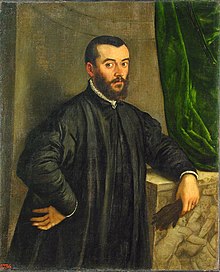
Back Andreas Vesalius ALS أندرياس فيزاليوس Arabic اندرياس فيزاليوس ARZ Andrés Vesalio AST Andreas Vezali Azerbaijani آندرئاس وزالیوس AZB Андрэас Везалій Byelorussian Андреас Везалий Bulgarian আন্দ্রে ভেসালিআস Bengali/Bangla Andreas Vesalius BS
Andreas Vesalius | |
|---|---|
 Portrait by Jan van Calcar | |
| Born | Andries van Wezel 31 December 1514 |
| Died | 15 October 1564 (aged 49) |
| Education | University of Leuven (M.D., 1537) University of Paris |
| Known for | De humani corporis fabrica (On the Fabric of the Human Body) |
| Scientific career | |
| Fields | Anatomy |
| Institutions | University of Padua (1537–1542) |
| Thesis | Paraphrasis in nonum librum Rhazae medici Arabis clarissimi ad regem Almansorem, de affectuum singularum corporis partium curatione (1537) |
| Academic advisors | Johann Winter von Andernach[1] Jacques Dubois[1] Jean Fernel[1] |
| Notable students | John Caius Realdo Colombo |
Andries van Wezel (31 December 1514 – 15 October 1564), latinised as Andreas Vesalius (/vɪˈseɪliəs/),[2][a] was an anatomist and physician who wrote De Humani Corporis Fabrica Libri Septem (On the fabric of the human body in seven books), what is considered to be one of the most influential books on human anatomy and a major advance over the long-dominant work of Galen. Vesalius is often referred to as the founder of modern human anatomy. He was born in Brussels, which was then part of the Habsburg Netherlands. He was a professor at the University of Padua (1537–1542) and later became Imperial physician at the court of Emperor Charles V.
- ^ a b c Andreas Vesalius of Brussels, 1514-1564 / [Charles Donald O'Malley]. University of California Press, 1964. p. 47. OCLC 429258. Archived from the original on 23 February 2022. Retrieved 23 February 2022.
{{cite book}}:|website=ignored (help) - ^ "Vesalius | Dictionary.com". www.dictionary.com. Archived from the original on 23 February 2022. Retrieved 23 February 2022.
Cite error: There are <ref group=lower-alpha> tags or {{efn}} templates on this page, but the references will not show without a {{reflist|group=lower-alpha}} template or {{notelist}} template (see the help page).
© MMXXIII Rich X Search. We shall prevail. All rights reserved. Rich X Search